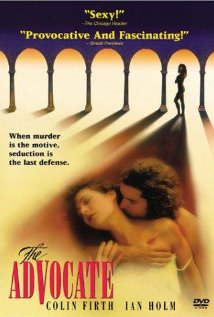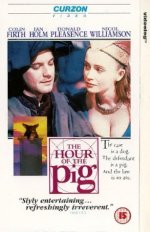The Perils of a Porker: The Hour of the Pig
“In a word where nothing is reasonable, in the end nothing can be truly mad.”
—- Albertus (Ian Holm)
I occasionally—I mean, I don’t dwell on it or anything, but occasionally– worry that when I say I like a film, that I’m the Box Office kiss-of-death for it. Then I think of the times that, against all expectations I’ve gotten it right and I feel a little better. Unfortunately this isn’t one of them. I’ve always thought that The Hour of the Pig, released in 1993, is a little diamond in the rough. It’s earthy, odd, uneven and sexy. I like it a lot. It also pretty much defies a category. It’s been called a drama, a murder- mystery and a black comedy and it is indeed all of those things. In fact, as far as black comedy goes it’s downright nightmarish at times. But it is undoubtedly original, raw and with a terrific cast that seem to put heart and soul into their performances, no matter how small their role.
When the captions roll at the start of the film, they inform us in part that: “In these uncertain times the State and the Law should have been guiding lights, but the Church was sometimes as corrupt as the State.”
Now that’s pretty disconcerting. You could be forgiven for thinking that you’re about to see a documentary on modern-day Ireland.
In fact it is set in fifteenth-century France, in the town of Abbeville, where the Parisian lawyer Richard Courtois (Colin Firth) has just arrived. Richard is a kindly sort but he definitely carries some daft illusions concerning the supposed simplicity of country life. Luckily, he has his clerk Mathieu—played with a brilliant dry humour by Jim Carter, now finding fame in Downton Abbey—to constantly undercut him and bring him back to reality. Just as well, really, because this place is a hornet’s nest if ever there was one and he’s about to lose his dreams of a peaceful existence pretty sharpish.
There’s the local lawyer, the serene but tricky Pincheon. It’s always a delight to see Donald Pleasance in form and here he is revelling in his part. There is the much lamented Nicol Williamson as the strangely open and likeable merchant-turned–lord Jehan d’Auferre. He is keen to pay the honest Richard a very respectable amount of money in order to get him on board and to remember which side his bread is buttered on. He is also trying to marry off his daughter Filette (Lysette Anthony), who may be worth a lot of land, very well endowed and permanently on heat, but who has a laugh like a tortured donkey.
At least he has the apparently harmless local priest Albertus (Ian Holm) to give him advice. As well as keeping him up to date with his own permanent lust for the ladies: “In His wisdom He sent them for our temptation; and by heavens He knew what he was doing.”
After explaining his highly suspect seduction technique, Richard comments: “There must be priests in Hell.” With a laugh Albertus replies: “You can’t move for them.”
I was going to say something witty about the Catholic Church there, but I’ll leave you to fill in your own comments. Don’t tell me you’re not thinking the same thing.
Richard also has Maria to warm his bed and by God is this girl up for it. “Waste not, want not”, she announces as she climbs aboard the barely awake Advocate. She’s played by Sophie Dix, an actress that we’ve never seen enough of. (Well, we do here but that’s different.) She has an earthy quality that suits this film perfectly and a glint in the eye that always makes me wish that she had been cast just once in one of Ken Russell’s wilder romps.
However, the one that Richard is really smitten with is the Moorish Gypsy girl whose family have been passing through the village. The exotic Samira, played by Amina Annabi is the owner of a pig that has been arrested for the murder of a little Jewish boy and Richard has to defend it. As Donald Pleasance’s character puts it with a straight face: “Murder is murder, whether it is committed by a half-witted man or a pig of prodigious learning.”
It seems to have been incredible but true that in certain areas at that time animals were held to be just as accountable as humans in the eyes of the law. In fact the movie opens with a donkey sharing the gibbet with the farmer who has sodomised it. To the relief of all, the animal is found to be of good character whilst the man hangs. I guess that would be another example of the law being an ass, boom boom!
This could all be very silly if dealt with in a certain way, but in fact it is played relatively straight and, despite the many comic moments, what emerges is a township living in fear. The peasants are superstitious but the ‘higher-born’ are knowing and cynical. When, in exasperation, Richard snaps at the noble: “One law for the rich!” he is told “Yes—always.” And underneath the superstitions there is a real evil at work. It may not be the suggested Cathar conspiracy or even the shadow of the Inquisition but it is there.
The Hour of the Pig is a film that I’ve always had a soft spot for and yet I know next to nothing of the writer/director Leslie Megahey. He seems to have done some documentary work and I think that he also writes for The Guardian newspaper, but I’ve not seen any other feature films from him, which is a shame. It was released in the States where the heathen Americans changed the title to The Advocate; and if I’m honest that probably makes more sense. But then they unforgivably cut ten minutes from it, which not only confused people but also meant that they missed a lot of Sophie Dix going wild! No excuse. Try to see the 112-minute version.
We learn through the end credits that it is based on the real life Advocate Bartholomew Chassenee, who defended a great many animals during that period and, in the course of later defending the type that walk upright, became one of the greatest lawyers of his time.
Which goes to prove something. I’m just not sure what.



Recent Comments